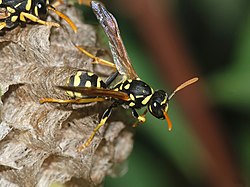This is an old revision of this page, as edited by 190.44.158.38 (talk) at 01:24, 10 October 2012 (These terms do not appear in Schmidt's published work, so it's completely bizarre to claim that there are "reliable sources" saying that they do. There are not. These are journalistic inventions.). The present address (URL) is a permanent link to this revision, which may differ significantly from the current revision.
Revision as of 01:24, 10 October 2012 by 190.44.158.38 (talk) (These terms do not appear in Schmidt's published work, so it's completely bizarre to claim that there are "reliable sources" saying that they do. There are not. These are journalistic inventions.)(diff) ← Previous revision | Latest revision (diff) | Newer revision → (diff)
The Schmidt Sting Pain Index is a pain scale rating the relative pain caused by different Hymenopteran stings. It is mainly the work of Justin O. Schmidt, an entomologist at the Carl Hayden Bee Research Center in Arizona. Schmidt has published a number of papers on the subject and claims to have been stung by the majority of stinging Hymenoptera.
His original paper in 1984 was an attempt to systematize and compare the hemolytic properties of insect venoms. The index contained in the paper started from 0 for stings that are completely ineffective against humans, progressed through 2, a familiar pain such as a common bee or wasp sting and finished at 4 for the most painful stings. In the conclusion, some descriptions of the most painful examples were given, e.g.: "Paraponera clavata stings induced immediate, excruciating pain and numbness to pencil-point pressure, as well as trembling in the form of a totally uncontrollable urge to shake the affected part."
Subsequently, Schmidt has refined his scale, culminating in a paper published in 1990 which classifies the stings of 78 species and 41 genera of Hymenoptera. Schmidt described some of the experiences in vivid detail.
An entry in The Straight Dope reported that the following "implausibly exact numbers" do not appear in any of Schmidt’s published scientific papers but were "wheedled out of him" by Outside magazine for an article it published in 1996.
| Index | Animal |
|---|---|
| 1.0 | Sweat bee |
| 1.2 | Fire ant |
| 1.8 | Bullhorn acacia ant |
| 2.0 | Bald-faced hornet |
| 2.0 | Yellowjacket |
| 0 – 2.0 | Honey bee and European hornet |
| 3.0 | Red harvester ant |
| 3.0 | Paper wasp |
| 4.0 | Tarantula hawk |
| 4.0!+ | Bullet ant |
See also
- Dol scale to measure pain
- Starr sting pain scale "A Pain Scale for Bee, Wasp and Ant Stings" by Christopher Starr
- Justin O. Schmidt The creator of the "Schmidt Sting Pain Index"
References
- Schmidt, J. O., Blum, M. S., and Overal, W. L. "Hemolytic activities of stinging insect venoms", Archives of Insect Biochemistry and Physiology, 1:155–160, 1984.
- Schmidt, Justin O. "Hymenoptera venoms: striving toward the ultimate defense against vertebrates" in D. L. Evans and J. O. Schmidt (Eds.), "Insect defenses: adaptive mechanisms and strategies of prey and predators" pp. 387–419, State University of New York Press, Albany, 1990.
- Cecil Adams (May 11, 2012) Did the creator of the Schmidt Sting Pain Index volunteer to get stung by everything on earth?, The Straight Dope
- Berenbaum, May. "A Stinging Commentary", American Entomologist, v. 49 n. 2, pp. 68-69
- Conniff, Richard. "The King of Sting", in Outside, v. 21 n. 4 (April 1996), pp. 82–84, 147.
- Conniff, Richard. "Stung: How tiny little insects get us to do exactly as they wish", Discover, June 2003.
- Evans, David L. Insect Defenses: Adaptive Mechanisms and Strategies of Prey and Predators, Table 14.1, 1990. ISBN 0-88706-896-0